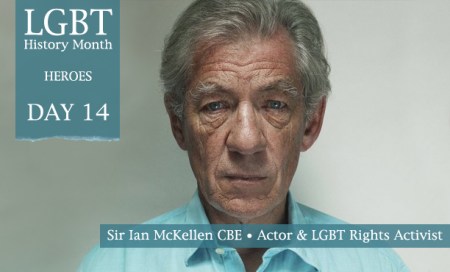LGBT Heroes – Day 14
In 1996 I worked on the HBO television movie about the ‘mad monk’ Rasputin. The film was shot almost entirely on location in the cities of Budapest and St. Petersburg, which meant the production had booked a large number of flights to those destinations. One of my many tasks as the London production office runner was a courtesy meet-and-greet at Heathrow airport to hand over tickets to cast & crew, and to ensure that they reached their flights with ease. On his third outbound flight (this time to St. Petersburg) I met Sir Ian McKellen – who always insisted I call him “just Ian” – with his first class tickets. He expressed his gratitude and remarked that the production would benefit having someone so diligent on the film set in Russia. I revealed that, on this particular occasion, I was also flying to Russia. On discovering that I was (naturally) travelling in economy, he dragged me to the ticket desk where he paid for my upgrade to first class. He did not ask the company to reimburse this expense.
In retrospect, as a young gay man sat in first class with a role model and cultural hero, I was (probably) rather a little too inquisitive, but each candid answer prompted another question which revealed a fascinating story of a Lancashire lad’s simple dream to become an actor. However, in the late ’80s, Section 28 reared its ugly head and the simple dream was no longer an option for him. During a debate regarding Section 28 on BBC Radio 3 he came out publicly as a gay man. I was particularly interested in the circumstances of his knighthood, which had been conferred upon him 3 years later. At the time, his contemporaries had vocally opposed his acceptance because it had been given to him by the same Thatcher government that had orchestrated Section 28 – he was, after all, one of its most famous and fiercest opponents. But he believed that the knighthood could be used as an instrument to help him achieve equality. The mere fact that he was the first openly gay man to be knighted was relevant and important. It was the catalyst of his self-penned one-man show, A Knight Out. The show was a theatrical autobiography in which he laid bare his life as a gay man via personal tales and through quotes & anecdotes of gay personas throughout history. First staged in 1994, it was a show that tackled the ignorance of homophobia through wit, humour and pathos (and memorably encouraged the audience to rip out Leviticus 18:22 from all hotel Bibles – something that I still do to this day). The play was reincarnated several times in the following years, and the ticket sales benefitted community theatres and gay organisations.
Since his public self-outing he has consistently fought for LGBT rights. He co-founded the LGBT rights lobby group Stonewall, is a patron of the Albert Kennedy Trust and has also been a patron of LGBT History Month since speaking at the launch of its inception. Recently he has criticised LGBT rights violations on an international level in Moscow and Singapore, whilst here at home he has visited and spoken at schools in South East London about homophobic bullying.
He has, as he always intended, used his knighthood wisely – devoting his time and energy generously. A generosity indicative of the person who paid for a first class ticket for a production runner who was going to sit alone in economy. He was to me then, as he still is today, an exemplary role model and hero.
Sir Ian McKellen is featured in a photographic series entitled Pink Portraits on view in Cardiff during LGBT History Month.



















